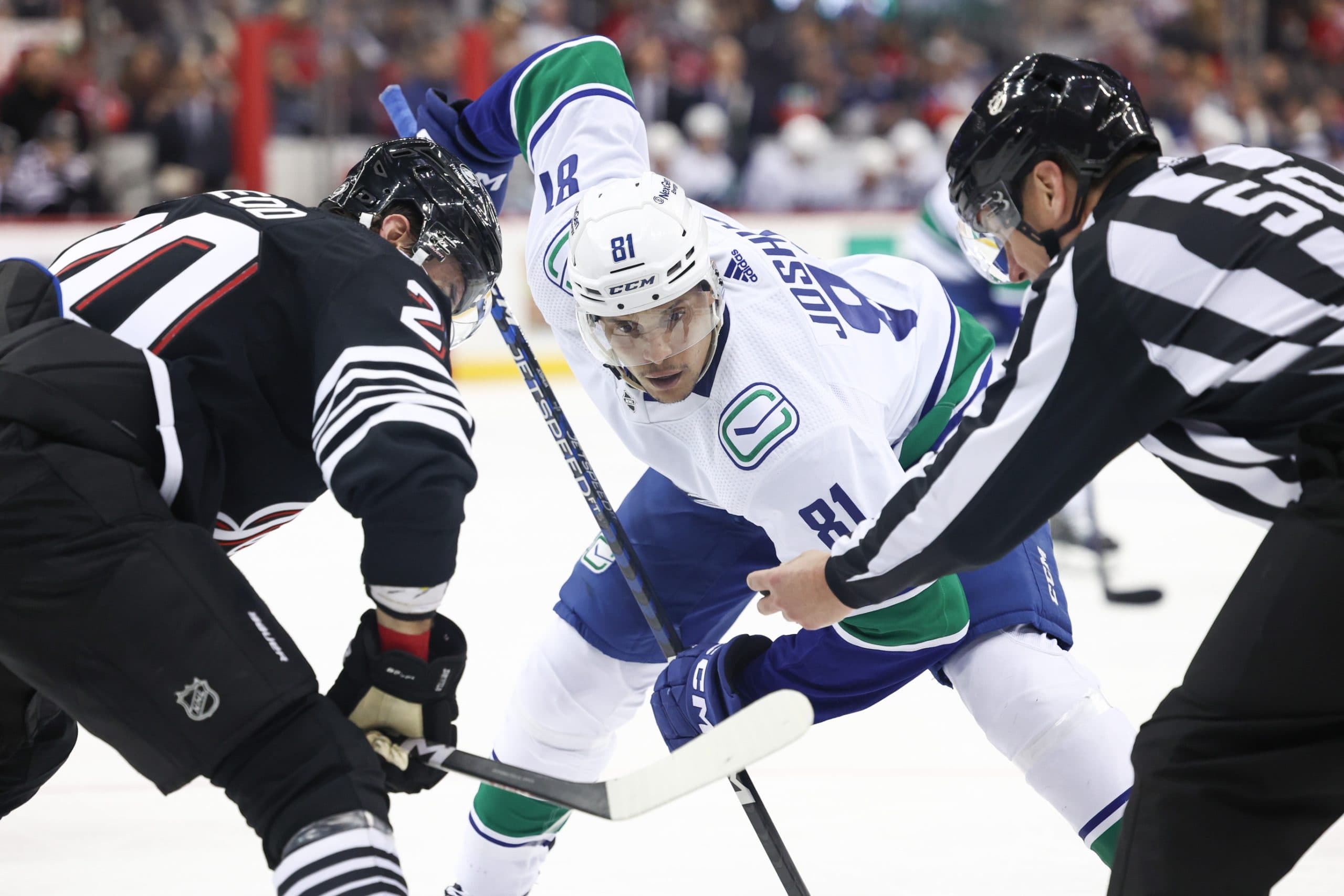Nation Sites
The Nation Network
CanucksArmy has no direct affiliation to the Vancouver Canucks, Canucks Sports & Entertainment, NHL, or NHLPA
It depends what the Canucks do next before grading the Joshua trade: Canucks Conversation

Photo credit: © Vincent Carchietta-USA TODAY Sports
Jul 20, 2025, 12:28 EDTUpdated: Jul 20, 2025, 12:32 EDT
On Thursday’s episode of Canucks Conversation, Irfaan Gaffar and Harman Dayal broke down the Vancouver Canucks’ decision to trade forward Dakota Joshua to the Toronto Maple Leafs for a 2027 fourth-round pick. While the return left some fans cold, Harm and Irf emphasized that the value of the trade depends on what Vancouver does next.
“My initial reaction to the trade was, it depends on what they do with the cap space,” Harm said. “If this allows them to go ahead and sign Jack Roslovic, who would fit a need at the centre position, then I support it, see the vision and think it makes sense. But if they don’t land Roslovic, or a similar calibre centreman, then I don’t like the move as much.”
The Canucks opened up over $3 million in cap space by moving Joshua, who signed a four-year deal with the Canucks at a $3.25 million AAV last offseason. While that may have seemed steep at the time of the signing, Harm pointed out that the rising cap changes the equation.
“In a flat-cap world you might’ve seen that as a risky contract,” he said, “but when the cap is rising this much, I think it’s straight up market value for what Dakota Joshua is.”
Even considering his down year, Harm believes the price is fair. “He was obviously hindered by the pre-season cancer diagnosis and battling other injuries throughout the season,” Harm added. “The Canucks didn’t get much in return, it’s underwhelming in a fourth-round pick, and you’re dealing Joshua at a lower ebb of his trade value compared to a year ago when he had scored 18 goals and was coming off a pretty good playoff run.”
Joshua, known for his size and physical style, was reportedly a hot commodity in past trade talks. “There were a lot of teams and reporters talking about Joshua being a really appealing target,” Harm said. “He was in-demand a year ago, so they’re clearly selling low here. But again, it all depends on what they do with the cap space.”
From Toronto’s side, Irf didn’t see an obvious path for Joshua to earn a regular role.
“From the Maple Leafs’ perspective, it’s another forward which they have a million of right now,” he said. “I think it’s going to be hard for Dakota Joshua to be an every-day guy on that roster so there will be some interesting things happening there.”
What comes next for Vancouver is the more compelling storyline, especially as free agent centre Jack Roslovic remains unsigned.
“If it’s going to be Jack Roslovic, they’re going to move on it pretty quick,” Irf said. “He’s still out there as a free agent, probably knows what he wants and the Canucks likely know as well. He’s a right-shot centre who can fill and play on the wing as well, which from the Canucks’ perspective is a need of theirs.”
But Roslovic might not be the only target. Irf floated a bigger possibility: that Vancouver might be clearing room for a larger move.
“Is this for something bigger? That’s where it gets very interesting to me,” he said. “You look at the assets the Canucks have- actual assets that will get you something in return. You have the cap space now, but then you go through the list of guys that you could potentially move to get a Marco Rossi or Mason McTavish out of Anaheim. Those guys include Willander, D-Petey [Elias Pettersson], maybe Nils Höglander to try and get you something in return if the Canucks are going to explore that avenue.”
Still, as Harm pointed out, that kind of blockbuster may be tough to pull off given Vancouver’s current financial situation.
“They’ve got some cap space, but according to PuckPedia, they’ve got around $4 million,” Harm said. “If we’re talking about the Rossi-McTavish tier, you’d still need to clear out another contract before you can afford those guys. On a long-term deal, they’re going to cost around the $7 million range unless you try to get them on a bridge deal. There would have to be other moving parts.”
In the short term, Harm sees Roslovic as the more realistic target.
“You don’t have to move additional space to afford him, he’s already available,” Harm said. “Whereas for Rossi or McTavish, there would be a steep acquisition cost, and we don’t even know if McTavish is available in the first place.”
The Canucks’ decision to move on from Joshua won’t be fully understood until fans see what the freed-up cap space is used for. Whether it’s a mid-tier upgrade in Roslovic or a swing at a bigger name like Rossi, the next move will determine whether this trade was a value-clearing success or just another case of selling low.
Sponsored by bet365
Breaking News
- Did Jonathan Lekkerimäki’s 2025-26 season move him closer to or further from being a full-time Canuck?
- JPat’s Monday Mailbag: What’s next for the Canucks and their fans following the Olympic break?
- Instant Reaction: Jack Hughes stuns Canada 2-1 in gold medal overtime
- Gavin McKenna’s recent production could make him the indisputable first overall pick
- Kevin Lankinen Canucks’ lone Olympic medalist as Finland captures bronze
